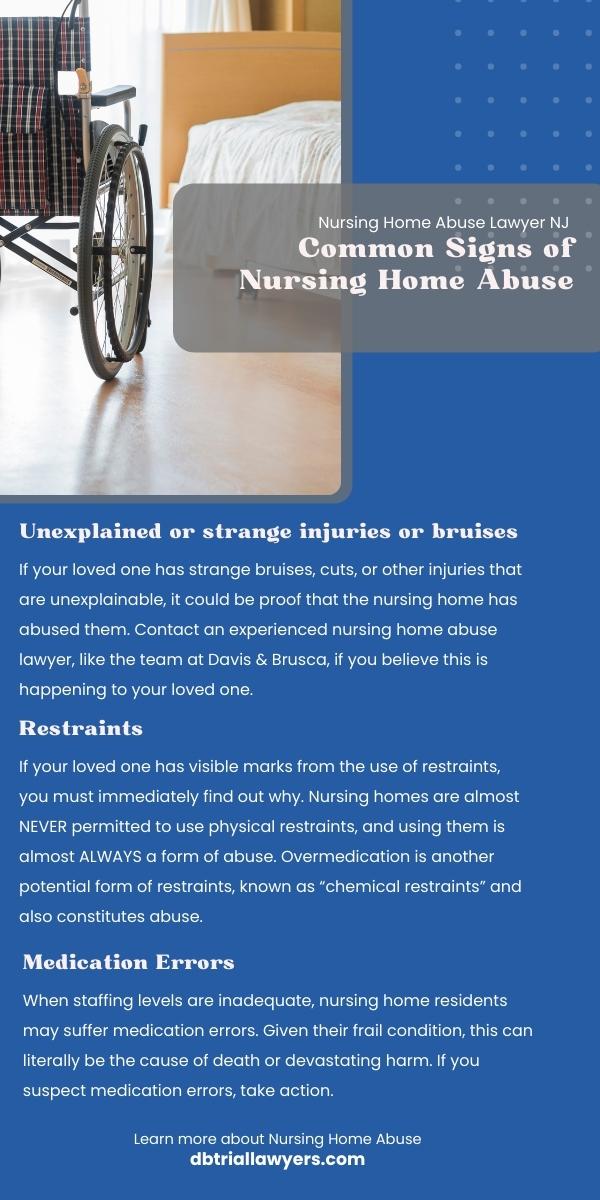Key Facts Every Legal Representative Must Understand About Senior Citizen Misuse Regulation
Elder abuse is a complex issue that demands lawful focus. Legal representatives must grasp the nuances of pertinent regulations, including government mandates and state-specific statutes. Recognizing the sorts of misuse, reporting responsibilities, and available legal solutions is necessary for efficient campaigning for. As the maturing population expands, so too does the need for lawyers to be equipped with the right expertise. The ramifications of this expertise are profound, leading to important questions regarding defense and justice.
Understanding Senior Citizen Abuse: Types and definitions
Elder abuse includes an array of harmful habits routed towards older adults, typically causing physical, emotional, or economic harm (Nursing Home Abuse). This abuse can materialize in numerous kinds, consisting of physical abuse, which includes causing bodily injury, and psychological abuse, characterized by mental torment and manipulation. Neglect, one more substantial type, takes place when caregivers fail to supply necessary care, causing damage in the elder's health and wellness or well-being. Financial exploitation involves the unauthorized use of an older's funds or possessions, often committed by those in relied on positions. Additionally, sexual assault, although much less regularly reported, represents a severe violation of a senior's self-respect. Recognizing these types and meanings is vital for identifying the signs of older misuse and making sure the safety and security and rights of older grownups. Recognition and education and learning regarding these numerous forms can equip neighborhoods to interfere and support those in prone circumstances successfully
Lawful Framework: Federal and State Laws
While various kinds of older abuse are acknowledged, the legal structure dealing with these problems is important for securing older grownups. At the federal degree, laws such as the Senior Justice Act establish stipulations to stop and react to older neglect, exploitation, and misuse. This act offers financing for study, training, and sources focused on boosting the protection of at risk seniors.
State legislations additionally play a vital role, as each state has its very own laws defining older abuse and describing enforcement devices. These laws usually encompass a variety of misuses, including physical, emotional, economic, and neglect. In addition, some states have carried out specific elder abuse devices within police to concentrate on these instances.
With each other, federal and state laws develop a complete framework designed to combat older abuse, making certain that older grownups receive the protection and support they require in their communities.
Required Coverage Needs for Specialists
Required reporting demands for professionals outline the obligations to report believed elder abuse to the appropriate authorities. Failing to conform with these commitments can result in significant legal effects, consisting of fines and potential civil obligation. Comprehending these demands is crucial for professionals functioning with prone populaces to guarantee their security and security.
Reporting Responsibilities Summary
How can specialists guarantee the safety and security of at risk grownups? One significant method is through understanding and sticking to obligatory coverage requirements. Lots of territories enforce lawful responsibilities on particular experts-- such as healthcare workers, social employees, and regulation enforcement officials-- to report suspected senior abuse. These laws aim to safeguard prone adults by guaranteeing that any type of signs of abuse or neglect are without delay checked out. Professionals must be mindful of the details signs of older abuse, including physical, emotional, and financial exploitation. On top of that, reporting must be performed in a timely manner to promote quick treatment. By fulfilling these reporting obligations, professionals play a necessary duty in safeguarding the health of senior people and promoting a society of accountability and vigilance against misuse.
Lawful Effects for Non-Reporting
Failing to abide by compulsory reporting requirements can bring about considerable lawful effects for specialists charged with guarding susceptible grownups. Experts such as doctor, social workers, and regulation enforcement officials are legally obligated to report believed instances of elder abuse. Failure to do so might lead to civil responsibilities, including lawsuits or penalties. In some jurisdictions, non-reporting can result in criminal costs, potentially causing offense or felony sentences. In addition, experts might deal with disciplinary activities from licensing boards, consisting of suspension or abrogation of their licenses. These lawful consequences underscore the significance of sticking to reporting regulations, which are designed to protect vulnerable populations and guarantee that cases of elder misuse are dealt with without delay and appropriately.

Signs and Signs of Elder Abuse
Acknowledging the symptoms and signs of senior misuse is crucial for protecting prone individuals. Older misuse can manifest in numerous kinds, consisting of physical, psychological, monetary, and overlook. Physical signs may include inexplicable contusions, cracks, or indications of restraint. Emotional misuse commonly provides as withdrawal, terror, or sudden changes in behavior. Sufferers may exhibit signs of stress and anxiety, depression, or complication.
Financial misuse might be suggested by abrupt adjustments in economic status or missing prized possessions, while overlook can be recognized with poor health, malnutrition, or dangerous living conditions. It is necessary to keep in mind that these indicators can overlap, and one sign alone may not signify misuse. Observing multiple signs in conjunction can offer a clearer photo. Caretakers and member of the family ought to continue to be cautious and aggressive in identifying these indications to ensure the wellness of older grownups and help with timely intervention when essential.
Legal Treatments Readily Available for Victims
Targets of senior abuse have a number of legal remedies readily available to them, offering methods for justice and defense. These solutions consist of civil suits for problems, prosecution alternatives versus wrongdoers, and the opportunity of obtaining protective orders and restraints. Each choice serves to deal with the harm experienced by targets and to assist stop further abuse.

Civil Legal Actions for Problems
Elder misuse victims commonly seek justice through civil claims, which supply an important legal treatment for those hurt by negligence or deliberate misconduct. These legal actions enable victims or their families to sue for physical, emotional, or monetary injury sustained as a result of the activities of caretakers, taking care of homes, or various other liable events. Usual claims in these situations include neglect, deliberate infliction of psychological distress, and breach of fiduciary obligation. Targets can seek offsetting problems to cover medical costs, pain and suffering, and compensatory damages targeted at deterring future misbehavior. Civil legal actions not only use economic alleviation yet also offer to hold abusers responsible, thus adding to wider societal modifications in the treatment of prone older populaces.
Prosecution Options
A significant number of senior misuse cases may also bring about prosecution, offering one more method for justice beyond civil remedies. District attorneys can seek charges for different offenses, including scams, assault, or disregard, depending on the details circumstances of the misuse. Offender prosecution offers not just to punish offenders but also to hinder additional abuse and shield vulnerable people. The legal requirements for criminal instances differ from civil cases, frequently calling for a greater burden of evidence, normally "past an affordable question." Sufferers or their supporters may collaborate with police to report incidents, making sure that the lawful system holds perpetrators accountable. Overall, prosecution is an essential device in the battle against senior misuse, reinforcing social norms versus such criminal activities.
Protective Orders and Restrictions
When individuals deal with hazards or injury due to senior abuse, protective orders and restraints arise as vital lawful solutions to protect their security and health. Safety orders, commonly released by courts, offer to legally ban abusers from contacting or approaching sufferers, consequently offering prompt alleviation. These orders can vary in duration and may consist of details stipulations customized to the target's requirements. Restrictions, on the other hand, include physical actions absorbed care facilities or in the house to stop additional injury, though they have to follow legal requirements to ensure they do not infringe on the senior's civil liberties. Generally, these legal systems aim to empower targets, offering them a structured approach to seek security and defense from ongoing abuse.
The Duty of Guardianship in Securing Senior Citizens
Guardianship plays a vital role in safeguarding the well-being of elders, particularly when they are incapable to make educated choices regarding their care and funds. This lawful arrangement assigns a responsible individual or entity to manage the individual and economic affairs of an incapacitated elderly. Guardianship is specifically vital in cases where seniors are at risk to misuse, exploitation, or disregard, as it offers a protective structure guaranteeing their rights and needs are prioritized.
The duties of a guardian consist of making health care decisions, handling property, and ensuring that the elderly's living problems are helpful and secure. In addition, guardians are needed to stick to lawful criteria and record routinely to the court, promoting liability and openness. By assisting in oversight, guardianship acts as an essential mechanism to shield seniors, promoting their dignity and boosting their high quality of life in possibly harmful scenarios.
Resources for Legal Professionals and Advocacy Groups
Access to substantial sources is crucial for attorneys and advocacy groups functioning to battle senior abuse and safeguard vulnerable elders. Many organizations provide crucial info, consisting of the National Facility on Elder Abuse, which supplies research study, training, and guidelines on older misuse avoidance. Lawyers can take advantage of state-level firms that offer particular laws and laws concerning senior protection.
In addition, many campaigning for teams, such as AARP and the Elder Justice Union, provide resources, legal tools, and networking chances. On the internet platforms, like the Legal Solutions Company, give access to legal aid resources for low-income senior citizens.
Proceeding education and learning is essential; because of this, webinars and seminars hosted by legal associations can improve understanding and abilities. Collaboration with health care experts and social workers is also crucial to develop a multidisciplinary approach to resolving elder abuse. Making use of these resources enables lawyers and campaigning for teams to properly advocate for the civil liberties and Elder Abuse security of the elderly population.
Regularly Asked Questions
How Can Attorneys Remain Updated on Elder Abuse Regulations Modifications?
Legal representatives can remain upgraded on senior abuse legislation changes by registering for legal e-newsletters, going to relevant workshops, joining professional organizations, and frequently examining state and government legal resources and updates important to older law.
What Prevail Defenses Versus Senior Abuse Allegations?
Usual defenses versus older abuse accusations include demonstrating absence of intent, confirming consensual activities, providing evidence of psychological incapacity in the accuser, and showing adherence to caregiving standards. Nursing Home Abuse Lawyer. Each case calls for mindful assessment of conditions
Are There Certain Training Programs for Legal Representatives on Senior Citizen Misuse?
Yes, different companies provide certain training programs for lawyers concentrated on senior abuse. These programs intend to enhance understanding of lawful structures, instance administration, and advocacy strategies, gearing up lawyers to efficiently represent susceptible populaces.
How Does Senior Citizen Abuse Influence Estate Planning?
Older abuse greatly complicates estate planning by introducing concerns of ability, consent, and potential exploitation. Lawyers need to navigate these intricacies to guarantee customers' desires are valued while securing vulnerable people from adjustment or financial injury.
What Role Do Household Members Play in Senior Citizen Misuse Situations?
Member of the family commonly offer twin duties in older abuse instances, working as both caretakers and potential criminals. Their involvement can complicate investigations, as commitment and psychological ties might prevent reporting or dealing with violent actions properly.
This abuse can show up in numerous forms, consisting of physical misuse, which entails inflicting physical injury, and psychological abuse, characterized by mental torment and manipulation. At the government level, legislations such as the Elder Justice Act establish provisions to protect against and respond to elder exploitation, misuse, and forget. Several jurisdictions enforce lawful commitments on particular specialists-- such as healthcare workers, social workers, and law enforcement officials-- to report thought older misuse. Accessibility to comprehensive sources is vital for legal experts and campaigning for teams working to deal with older abuse and protect at risk elders. Various organizations offer crucial information, including the National Center on Senior Misuse, which provides study, training, and standards on senior abuse avoidance.